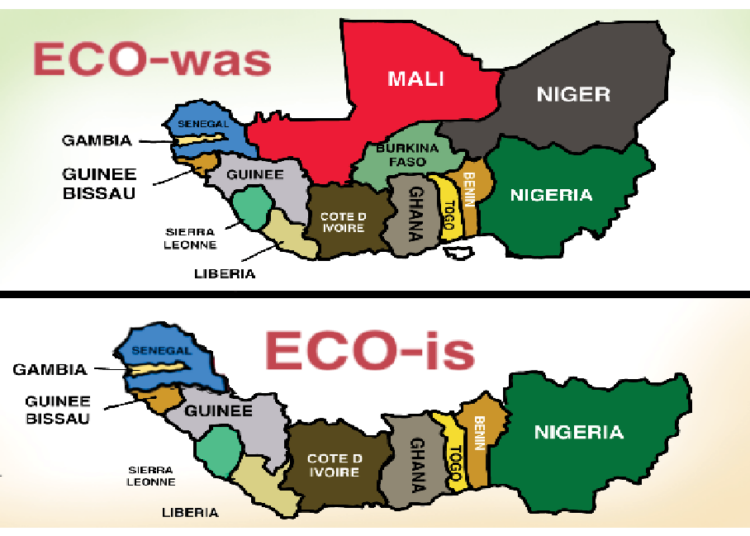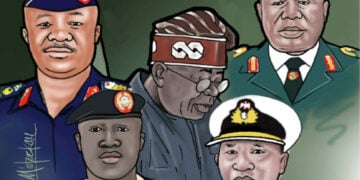The Economic Community of West African States (ECOWAS) is one of eight Regional Economic Communities (RECs) recognized by the African Union (AU). Until September 2023, it had 15 member states. However, Mali, Burkina Faso, and Niger announced their withdrawal following the formation of the Alliance of Sahel States (AES), disrupting regional integration efforts.
Before this disintegration, ECOWAS was one of Africa’s most advanced RECs. It had progressed into a Customs Zone with a Common External Tariff (ECOWAS CET) and agreed on a monetary policy, including a proposed single currency, the ‘ECO.’ The ECOWAS Monetary Cooperation Programme (EMCP) aimed to eliminate exchange rate volatility and enhance trade and investment flows.
However, the exit of Mali, Burkina Faso, and Niger threatens these efforts. AES was formed on September 16, 2023, through the Liptako-Gourma Charter, as a response to the countries’ suspension from ECOWAS following military coups. This development presents not just a diplomatic challenge but also an economic imbalance within the region and across Africa. By January 2025, the withdrawal became official, raising questions about trade and monetary policies, as these countries were part of the West African Economic and Monetary Union (UEMOA), which uses the CFA franc. If AES pursues alternative economic alliances, it could undermine ECOWAS’s ambitions for a unified currency and disrupt regional trade.
ECOWAS maintains that its doors remain open to these countries in the “spirit of regional solidarity” and has instructed remaining members to honour free movement principles until a clear future engagement is determined.
Challenges or Opportunities?
Despite ECOWAS’s goodwill, the emergence of AES creates an economic and geopolitical imbalance. Historically, ECOWAS has played a key role in trade negotiations, including the African Continental Free Trade Agreement and the EU Economic Partnership Agreement (EU-EPA). While these agreements were signed independently, ECOWAS members often presented a unified front, except for Nigeria’s differing stance on the EU-EPA.
Beyond politics, ECOWAS has facilitated trade liberalization, investment flows, and infrastructure development. The withdrawal of three landlocked states disrupts regional economic integration, particularly in trade and logistics. These countries rely on coastal ECOWAS states like Côte d’Ivoire, Ghana, Togo, and Benin for port access. New trade preferences and potential barriers could strain supply chains, impacting agricultural and energy trade. Coastal states depend on AES for livestock, while the Sahel imports refined petroleum and manufactured goods from ECOWAS. A fragmented trade system risks inefficiencies and price volatility.
Investment confidence is another concern. ECOWAS’s reduced market size and integration could deter foreign direct investment (FDI), particularly as member states leveraged regional stability to attract investors. Historically, Anglophone states have drawn more FDI than Francophone ones due to legal and linguistic differences, but ECOWAS’s collective strength has been a key factor. The exit of AES countries amplifies economic disparities, raising concerns about trade barriers and regional instability.
The AES states’ growing ties with Russia and China could reshape West Africa’s geopolitical and economic landscape. This shift may introduce competing economic models, weakening ECOWAS’s influence. Traditionally aligned with EU economic policies, ECOWAS has benefited from trade facilitation, development aid, and preferential market access. AES’s potential realignment could alter these dynamics.
Infrastructure and connectivity are also at risk. The exit means that key regional projects like the Lagos–Abidjan Corridor, Dakar–Bamako railway, and Nigeria-Morocco Gas Pipeline face uncertainty. These initiatives were designed to enhance inter-regional trade relations and energy security. AES states prioritizing independent economic strategies could cause delays, tariffs, logistical challenges and potentially undermine regional integration and supply chain efficiency.
The West African Power Pool (WAPP), aimed at integrating electricity supply across the region, may also fragment, exacerbating regional energy insecurity if AES countries pursue independent energy strategies. These political rifts will further strain economic ties, adding burdens to already fragile socio-economic conditions. ECOWAS must navigate these challenges to maintain stability, trade continuity, and economic cohesion amid AES’s divergence.
Remedial Actions
West Africa comprises largely underdeveloped states, with a combined per capita income estimated at $1,600. Socioeconomic challenges persist, including low access to quality healthcare, inadequate infrastructure, and high poverty rates. While the sovereign rights of States cannot be denied, exercising this right comes with delicate implications, especially in an era of growing interdependence among nations in the ever-evolving global economy. It is, therefore, not in the best interest of ECOWAS and the AES to engage in actions that would exacerbate the current socio-economic challenges.
ECOWAS continued leadership in the region will depend on its ability to reaffirm economic and political cohesion by strengthening unity among remaining member states to prevent further fragmentation and ensure policy continuity and predictability of the investment environment to maintain regional economic attractiveness.
The regional bloc will now more than ever have to demonstrate its capacity to enhance trade and infrastructure integration by fast-tracking the completion of key regional trade corridors, including the Lagos-Abidjan Corridor, Dakar-Bamako Railway, and Trans-Sahel Road as well as secure alternative financing for critical energy projects, such as the Nigeria-Morocco Gas Pipeline and West African Power Pool (WAPP), ensuring sustained energy security.
Additionally, ECOWAS must as a matter of urgency find innovative ways to mitigate investor concerns and boost economic resilience by implementing clear policy frameworks that align with existing principles and evolving global trends to assure investors of continued economic stability and explore alternative intra-ECOWAS trade routes as well as economic partnerships.
Finally, ECOWAS as a regional bloc must prioritise strengthening regional security cooperation to address the security concerns that influenced the withdrawal of AES states by reinforcing ECOWAS’s role in counterterrorism, border security, and regional stability. The regional bloc will have to find ways to foster collaboration with international partners to develop a sustainable security and economic framework that aligns with the region’s long-term goals.
Looking Forward
The emergence of AES signals a clear intent by its member states to pursue a distinct socio-political and economic agenda. While the AU’s position currently remains largely as an observer calling for restraint and renewed dialogue by both parties, there would however be a limit to the extent to which the AU can hold back in recognising the new REC considering the proliferation of RECs within the continental body. The probability that this alliance will redefine regional partnerships, international trade preferences and economic policies is high, potentially leading to shifts in trade agreements, investment preferences, and security cooperation.
ECOWAS must act swiftly to preserve its economic influence, ensure infrastructure continuity, and maintain regional stability. This includes keeping diplomatic channels open with AES while advocating for AU-mediated negotiations to prevent trade and security disruptions.
While the withdrawal of Mali, Burkina Faso, and Niger could have been avoided, the challenges now lie in managing its repercussions on regional development. ECOWAS and the AU must take a pragmatic approach, prioritizing leadership and policy guidance over coercive measures.
As the largest political and economic bloc, Africa has the potential to shape global socioeconomic and political trends through the AU. However, a lack of cohesion and weak leadership often undermine its continental progress and global influence. ECOWAS’s response to the formation of the Alliance of Sahel States will be a critical test of its ability to navigate evolving geopolitical dynamics and shape the future of West African integration.





